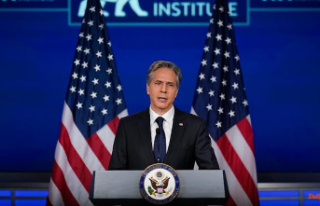The Paris climate agreement is to be implemented more quickly, so the power supply is to become CO2-free: the energy and climate ministers of the G7 countries agree on these goals in Berlin. Federal Environment Minister Lemke says she is going home "with a good feeling".
The industrialized nations of the G7 are committed to phasing out electricity generation from coal. At the end of the meeting of the climate, energy and environment ministers in Berlin, the G7 countries committed themselves for the first time to the goal of a predominantly CO2-free power supply by 2035. According to the Ministry of Economic Affairs, the participants also pledged in the final declaration to Ambition and doubling related financial aid to poorer countries by 2025. Federal Climate Minister Robert Habeck spoke of a "strong signal for more climate protection". Although it is no longer possible to undo global warming, the task now must be to slow it down.
Environment Minister Steffi Lemke explained: "I'm going home this afternoon with a good feeling, because this G7 meeting was a success for climate protection, for nature conservation and also for environmental protection." Germany currently chairs the G7 group of countries, which also includes France, Italy, Japan, Canada, the United States and Great Britain. Indonesia, as chair of the larger G20 group, also took part in the consultations in Berlin. Initial reactions from environmentalists were positive. The decision to phase out fossil fuels is "a strong and necessary signal, as is the intention to support poorer countries in phasing out fossil fuels and coping with climate-related damage and losses," said Greenpeace Germany's executive director, Martin Kaiser.
David Ryfisch, head of the international climate policy team at the environmental and development organization Germanwatch, said: "In the final text, the G7 gave a pleasingly clear answer to the energy crisis triggered by the Russian war of aggression: it lies in the accelerated expansion of renewable energies and an increase in energy efficiency ." In the almost 40-page final declaration, the G7 states undertake, among other things, to implement the 2015 Paris climate agreement more quickly. The world community has set itself the goal of limiting global warming to 1.5 degrees compared to the pre-industrial age, if possible. According to the Intergovernmental Panel on Climate Change, greenhouse gas emissions would have to be limited quickly and drastically.
The British President of the World Climate Conference, Alok Sharma, emphasized that the 1.5-degree target remains - but that additional efforts are necessary: "We must follow our words with deeds." Independence from fossil energies is necessary to overcome the climate crisis and the energy crisis. They want to provide 100 billion euros per year for developing countries.
The G7 countries also want to do more to preserve biodiversity and protect the seas. By 2030, they want to protect at least 30 percent of their own coastal and marine areas. They are also committed to ending ocean pollution with plastic waste and are committed to reaching a corresponding international agreement by the end of 2024.
On the fringes of the meeting that morning, representatives of Germany and the USA agreed on closer cooperation on energy and climate protection. German-American expert working groups are to work together permanently in four areas: The focus is on the development of the offshore wind energy sector, the topic of hydrogen, transport without greenhouse gas emissions and cooperation with developing and emerging countries.












